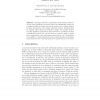Free Online Productivity Tools
i2Speak
i2Symbol
i2OCR
iTex2Img
iWeb2Print
iWeb2Shot
i2Type
iPdf2Split
iPdf2Merge
i2Bopomofo
i2Arabic
i2Style
i2Image
i2PDF
iLatex2Rtf
Sci2ools
110
click to vote
AUSAI
2004
Springer
2004
Springer
Longer-Term Memory in Clause Weighting Local Search for SAT
Abstract. This paper presents a comparative study between a state-ofthe-art clause weighting local search method for satisfiability testing and a variant modified to obtain longer-term memory from a global measure of clause perturbation. We present empirical evidence indicating that by learning which clauses are hardest to satisfy, the modified method can offer significant performance improvements for a well-known range of satisfiable problems. We conclude that our method’s ability to learn, and consequently to offer performance improvement, can be attributed to its ability to obtain information from a global measure of hardness, rather than from the contextual perspective exploited in previous works.
Artificial Intelligence | AUSAI 2004 | Global Measure | Local Search Method | Performance Improvement |
Related Content
| Added | 01 Jul 2010 |
| Updated | 01 Jul 2010 |
| Type | Conference |
| Year | 2004 |
| Where | AUSAI |
| Authors | Valnir Ferreira Jr., John Thornton |
Comments (0)

